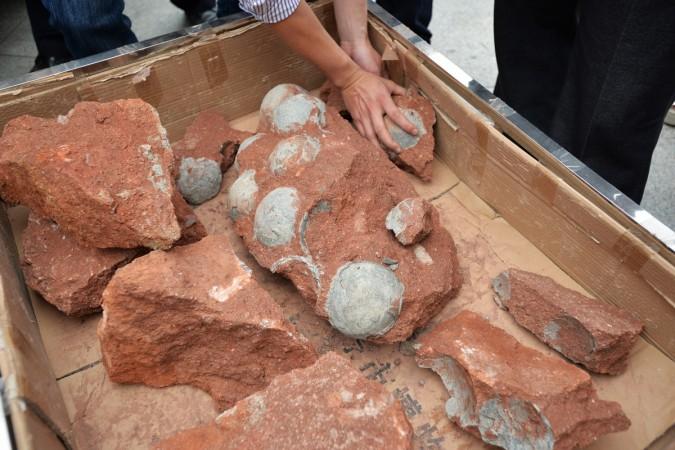
A construction crew in China's Jiangxi province was building a school on Christmas day last week when the workers stumbled upon something totally unexpected: A nest of perfectly-preserved dinosaur eggs that are believed to be about 130 million years old.
According to Chinese media reports, the construction works unearthed nearly 30 fossilised eggs in the city of Ganzhou, which is popularly known as the "hometown of dinosaurs," whom locals call "scary dragons."
The huge eggs, which are now being kept at the local Dayu County Museum for further studies, initially looked like a cluster of "oval-shaped stones" with a number of black debris — measuring 2 millimetres thick — seen lodged between them.
Although the workers suspected what they discovered were dinosaur eggs, experts finally confirmed that they were indeed fossilised eggs of the prehistoric giants from the Cretaceous period, which lasted from 145 million years ago to 66 million years ago.
Dinosaurs that were believed to have existed in Asia during the later part of the Cretaceous period. These included the velociraptor — a turkey-sized dinosaur considerably smaller than its size depicted in the popular Jurassic Park and Jurassic World movies.
The city of Ganzhou is known particularly for a rich deposit of dinosaur eggs — especially those of oviraptors, which were small and feathered dinosaurs living in an area covering modern Mongolia and Mainland China.
According to Nature.com, six oviraptorosaurian dinosaurs have been named from Ganzhou, including Banji long, Jiangxisaurus ganzhouensis, Nankangia jiangxiensis, Ganzhousaurus nankangensis, Huanansaurus ganzhouensis and Tongtianlong limosus.
Following last week's discovery, the area had to be cordoned off to protect the dinosaur fossils from passing heavy machinery.
In April 2015, construction workers made a similar discovery in Heyuan city in the southern Chinese province of Guangdong when they found 43 fossilised dinosaur eggs while repairing a road.












